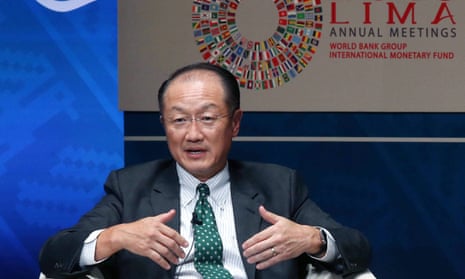The World Bank has pledged to boost by up to $29bn the financial assistance pledged to poorer nations to cope with climate change, bringing closer the possibility of reaching a target of $100bn a year by 2020.
Jim Yong Kim, the president of the World Bank Group, said it could boost funding by a third, from 21% to 28%, in response to client demand. He spoke at a meeting of the World Bank and the IMF in Lima, Peru.
“As we move closer to Paris countries have identified trillions of dollars of climate-related needs. The bank, with the support of our members, will respond ambitiously to this great challenge,” Kim said.
In 2014 rich countries and businesses provided close to two-thirds, nearly $62bn, of the “climate finance” which is part of the global climate change negotiations, before the Paris conference this December, according to the OECD.
Rachel Kyte, the World Bank’s special envoy for climate change, said the bank’s pledge coupled with commitments from Germany, France and the UK to double their climate finance and similar pledges from multilateral development banks in Asia, Europe and Africa meant the total pledges were “well on the way to $100bn”.
“It’s a global investment plan for moving the world towards [limiting temperature rises to] two degrees which represent trillions of dollars of investment opportunity,” she told the Guardian.
But Oxfam estimates only $2 billion of the total is going to the countries hardest hit by extreme weather caused by climate change, in the form of adaptation grants.
The charity’s climate change policy expert Isabel Kreisler said finance ministers should agree at least half of “public funding going towards the $100bn goal should be for adaptation”.
Most of the money is going to green energy investments such as climate-smart transport solutions, renewable energy and enhanced water security.
“We should now see climate finance as investment in the low carbon transition,” said Laurence Tubiana, the French ambassador for the COP21.
Finance ministers from the 20 countries most vulnerable to climate change, the V20, who held their inaugural meeting on Thursday, echoed calls to boost adaptation funding.
The countries range from Tuvalu, a Pacific island of 10,000 people, to Bangladesh and the Philippines.

Comments (…)
Sign in or create your Guardian account to join the discussion